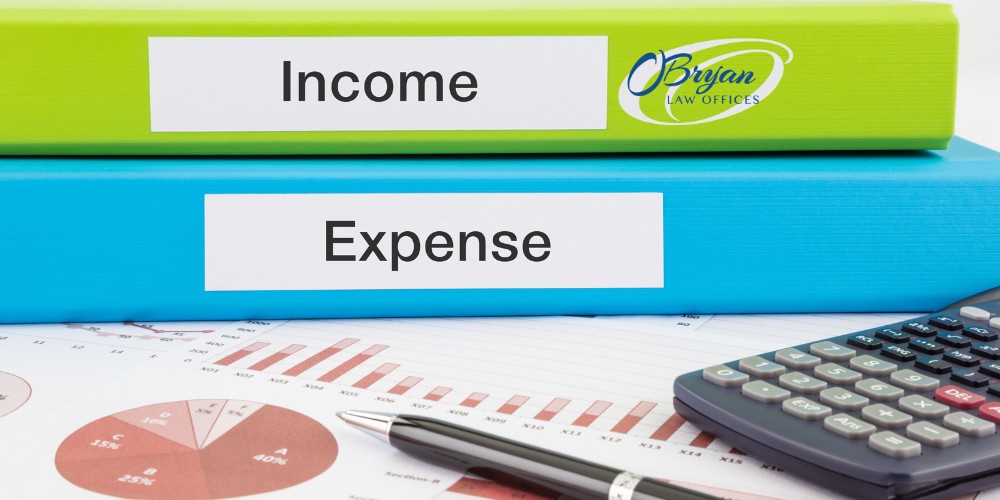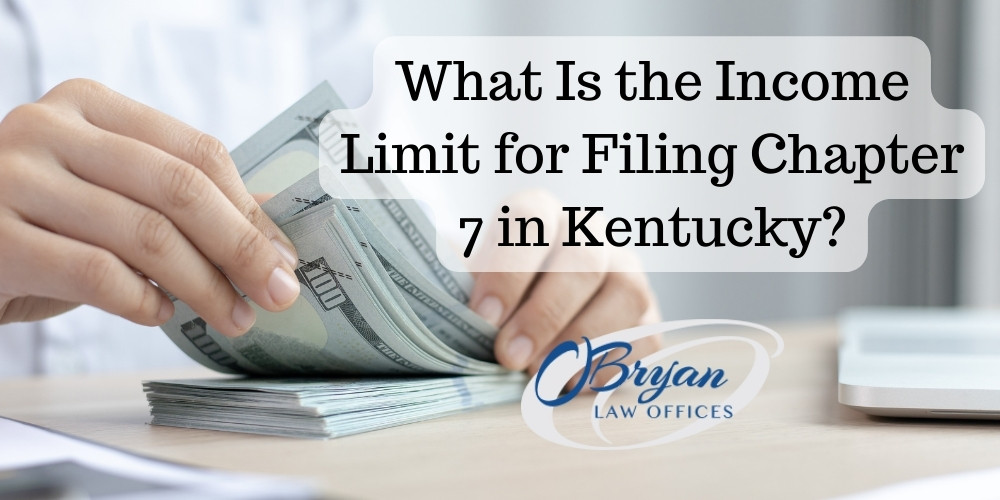Before someone can file for Chapter 7 bankruptcy in Kentucky, they must determine whether or not they make too much money to file. To do this, you’ll need to pass the Chapter 7 means test. This test measures whether or not your level of income exceeds the maximum amount allowed in Chapter 7. So, what is the income limit for filing Chapter 7 in Kentucky? This blog outlines the Chapter 7 income limits in Kentucky, as well as how you can calculate your own income.
At O’Bryan Law Offices, our Kentucky bankruptcy lawyers have extensive experience helping consumers prepare for bankruptcy, file their petitions, and complete their cases. In other words, we’ll be with you every step of the way. Whether you need to file for Chapter 7 or Chapter 13, we’ve got you covered. To schedule a free consultation with an experienced bankruptcy attorney, please call O’Bryan Law Offices at 502-339-0222 today.
What Is Chapter 7 Bankruptcy?
According to the United States Courts, Chapter 7 of the Bankruptcy Code “provides for ‘liquidation’ – the sale of a debtor’s nonexempt property and the distribution of the proceeds to creditors.” The main goal of Chapter 7 bankruptcy is to clear a debtor’s unsecured debts while also selling off non-exempt assets to pay the debtor’s creditors.
Those who have lost control of their current debts can greatly benefit from Chapter 7, as they receive the benefits of the automatic stay as soon as they file. The automatic stay protects bankruptcy filers from the following creditor actions.
- Wage garnishment
- Collection attempts
- Foreclosure
- Property repossession
- Eviction
- Cutting off utilities
Once you submit your bankruptcy petition to the local Bankruptcy Court, they will then have legal possession over your property. The court appoints a bankruptcy trustee to oversee your case, review your personal finances, and sell the nonexempt property. They will then use the proceeds from the sale to repay your creditors. To determine what property you can and cannot keep in Chapter 7, be sure to review the Kentucky bankruptcy exemptions before you file.
What Is the Chapter 7 Means Test?

Before you can qualify for a Chapter 7 bankruptcy case, you’ll need to pass what is called a Chapter 7 means test. The means test calculates whether or not you have enough income to repay your creditors. It measures your median income against your state’s median income for a family of the same size as yours.
If you make less than the average monthly income in your state, no further calculations are required. You have passed the means test. But how else can you pass the means test, and how are these numbers calculated? We answer these questions in the following sections.
How Do You Pass the Bankruptcy Means Test?
Start by calculating your current monthly income. You can do this by taking your gross income over the six months before filing bankruptcy, then multiplying this number by two. If, after this calculation, you make less than the median income for your state, you have passed the means test. If you make more than the median income in Kentucky, you still have a chance to qualify for Chapter 7 bankruptcy.
Making more than the average income in Kentucky doesn’t automatically disqualify you from Chapter 7. The next step is to calculate your monthly disposable income. This can be done by subtracting your monthly expenses from your gross income. The higher someone’s disposable income is, the less likely they are to qualify for Chapter 7 bankruptcy.
Exceptions to the Means Test
It’s important to note that there are a few exceptions to the Chapter 7 means test that may allow you to pass even if your median income exceeds your state’s median household income. There are three basic exceptions for disabled veterans, military reservists, and those with mostly non-consumer debt.
- Disabled veterans: Disabled veterans who incurred most of their debts while participating in homeland defense or while on active duty do not need to pass the means test to file for Chapter 7 bankruptcy. However, veterans must have a disability rating of at least 30% and must have been discharged due to that disability.
- Military reservists and National Guard: Those who are members of the National Guard or the military reserve are also exempt from passing the bankruptcy means test if they were either on active duty or participating in homeland defense for at least 90 days. This exclusion period doesn’t last forever. The exclusion applies for 540 days after the 90 days of military service. Once that time constraint passes, they must take the bankruptcy means test to qualify for Chapter 7.
- Primarily non-consumer debt: If you have mostly non-consumer or business debt, you may be exempt from passing the means test. Non-consumer debt is generally debt that is incurred with a business or profit motive in mind. If more than half of your debts are business debts, you may be able to avoid passing the means test.
When determining whether or not you qualify for Chapter 7 bankruptcy, it is extremely helpful to speak with a personal bankruptcy lawyer. Attorneys who primarily handle bankruptcy cases will be well-versed in the ins and outs of bankruptcy filings.
How to Calculate Your Household Income

To calculate the average monthly income for your households, start by adding together the gross income for everyone in the household over 15 years old. Include all forms of income, such as wages, refunds from income taxes, retirement income, rental income, Social Security income, tips, bonuses, child support, alimony payments, and other income. Add together all of these forms of income for each household member over 15. Then, divide this total by the number of people in the household.
Let’s say that you and your spouse both make $70,000 in annual income. You also have an 18-year-old child who makes $35,000 as a waiter. Adding together these three sources of income brings the total to $175,000 in annual income. If we divide $175,000 by the number of household members (3), we get an average household income of $58,333. Remember that this example also assumes that these are their only sources of income.
Median Household Income in Kentucky
According to the 2022 numbers from the Census Bureau, the median family income based on data compiled for ease of use in filling out bankruptcy forms is $51,978 for one earner in Kentucky. For a family of two, this figure increases to $61,790. For families of three and four people respectively, the median income amounts are $71,501 and $86,508.
As an example, let’s say that your household consists of three people in total, with two of you earning income. If your median income is less than $71,501, you have passed the means test.
How to Calculate Your Current Monthly Income vs Household Expenses
In order to calculate your disposable income for the means test, you’ll need to calculate your current monthly income, as well as your household expenses. Calculate your monthly income by including all sources of income, as we mentioned previously. Any income that you receive on a regular basis should be factored into your monthly income.
Then, calculate your household’s monthly expenses by adding up the following costs.
- Car payments
- Mortgage payments
- Healthcare expenses
- Regular living expenses
- Mandatory retirement contributions
- Domestic support obligations
- Union dues
- Utility bills
- Student loans
- Property taxes
- Insurance fees
- Other allowable expenses
Subtract your total monthly expenses from your monthly income to determine your disposable income. This is an essential part of Chapter 7 bankruptcy, but many people struggle with trying to fill out complicated forms on their own. If you need help in achieving debt relief through bankruptcy, an experienced consumer bankruptcy lawyer can help you.
Why Are Income Limits Important for Chapter 7?

Income limits in bankruptcy help to determine who can and cannot afford to repay their creditors. If you need bankruptcy relief, the means test exists to help filers determine which chapter is right for their situation. Both Chapter 7 and Chapter 13 have their benefits and drawbacks, but the main difference is that Chapter 13 involves a repayment plan.
With bankruptcy income limits, the assumption is that, if you pass the means test, you cannot afford to pay creditors. If you do not pass the means test, however, the assumption then becomes that you can afford to pay back a portion of your unsecured debt to your creditors.
What Are the Chapter 7 Bankruptcy Income Limits in Kentucky?
For Kentucky bankruptcy cases that are filed in late 2022 or after, the following income limits apply depending on household size.
| Household Size | Annual Income Limit |
| 1 | $51,824 |
| 2 | $61,945 |
| 3 | $70,091 |
| 4 | $87,902 |
| 5 | $97,802 |
| 6 | $107,702 |
| 7 | $117,602 |
| 8 | $127,502 |
| 9 | $137.402 |
Can You Make Too Much Money to File Chapter 7?
Technically, yes. However, simply making a lot of money won’t bar you from starting a Chapter 7 bankruptcy case. A high income earner will need to prove they want to file bankruptcy in good faith. This basically means that their listed expenses will have to be deemed reasonable by their creditors. As an example, high income earners cannot buy luxury items while also filing Chapter 7 to avoid paying their creditors.
What Happens if I Fail the Means Test?
If you fail the means test, you will not be able to file for Chapter 7 bankruptcy. Instead, they must file Chapter 13 bankruptcy. It is also possible that you failed the means test simply because of errors made while calculating your average income. Having an attorney present to help with your bankruptcy filing can be a lifesaver in this regard. We will help you ensure that all forms are filled out and filed correctly. This way, you can feel more confident in your next steps.
How Can a Kentucky Bankruptcy Attorney Help Me?

The decision to file bankruptcy is a difficult, often stressful process. Many filers are unsure of where to begin, and the process only gets more complicated as it proceeds. If you want to feel confident that Chapter 7 is the right fit for you, consider speaking with one of the bankruptcy lawyers at O’Bryan Law Offices. We will evaluate your financial situation and advise you on the best course of action.
Contact O’Bryan Law Offices Today
At O’Bryan Law Offices, we are extremely knowledgeable about Kentucky and Indiana bankruptcy law. If you are a Kentucky or southern Indiana resident who is struggling with their finances, our team is here to help. Whether you have consumer debt or business debt, filing bankruptcy can help you achieve a fresh financial start. To schedule a free consultation with a Louisville bankruptcy lawyer, please call our office at 502-339-0222 today.








